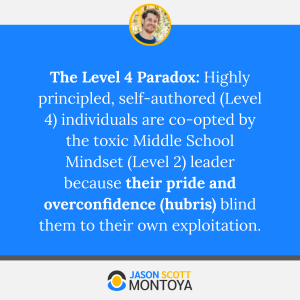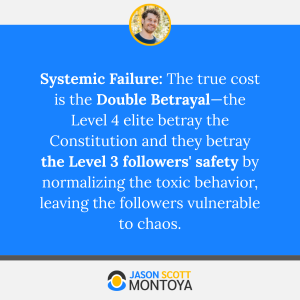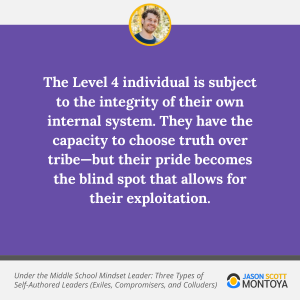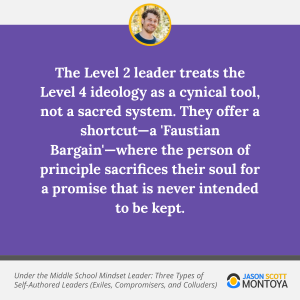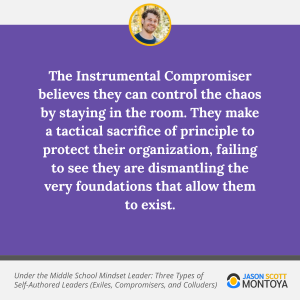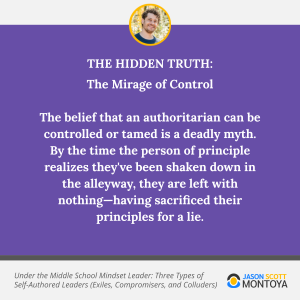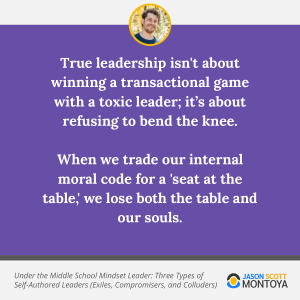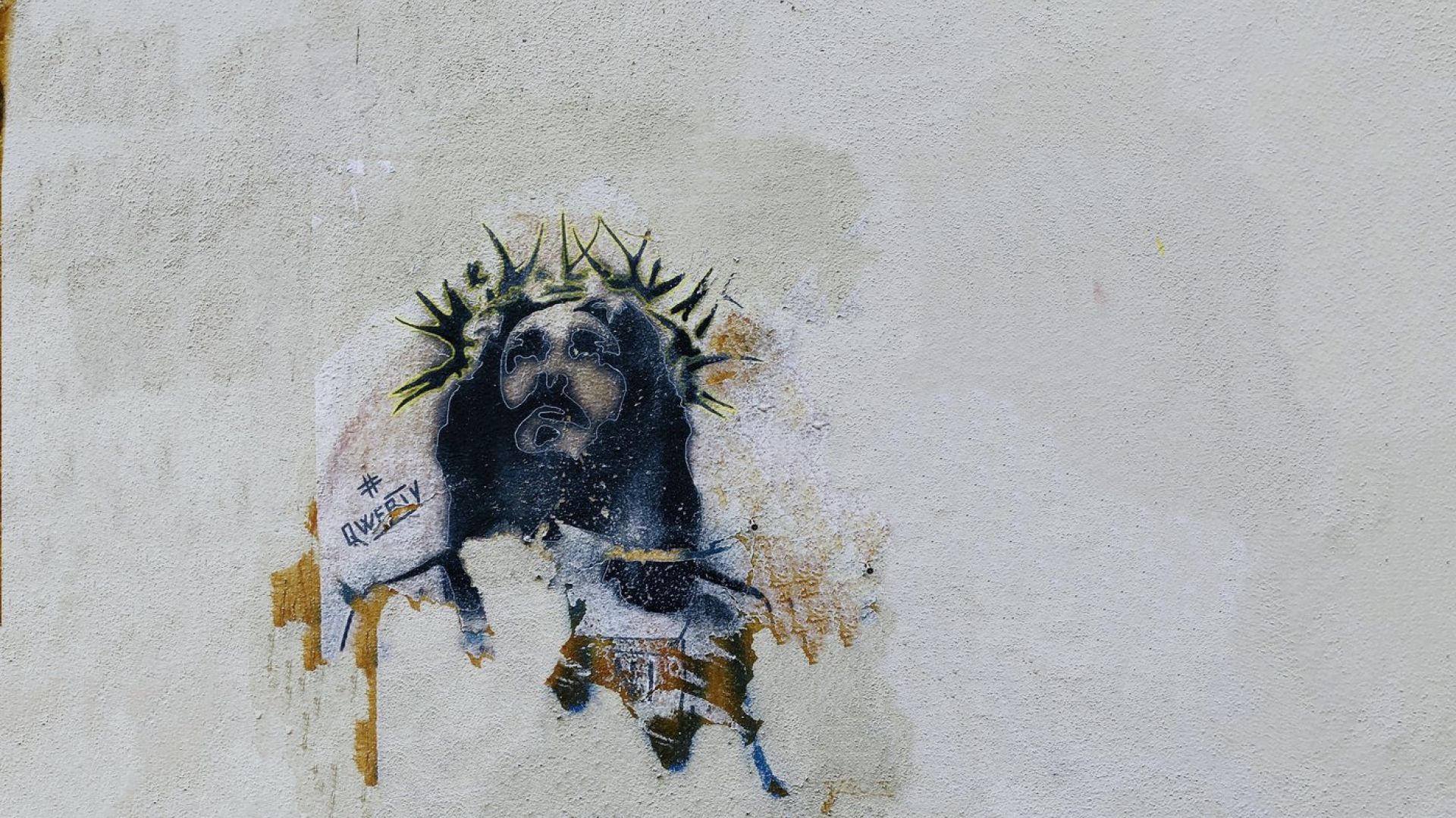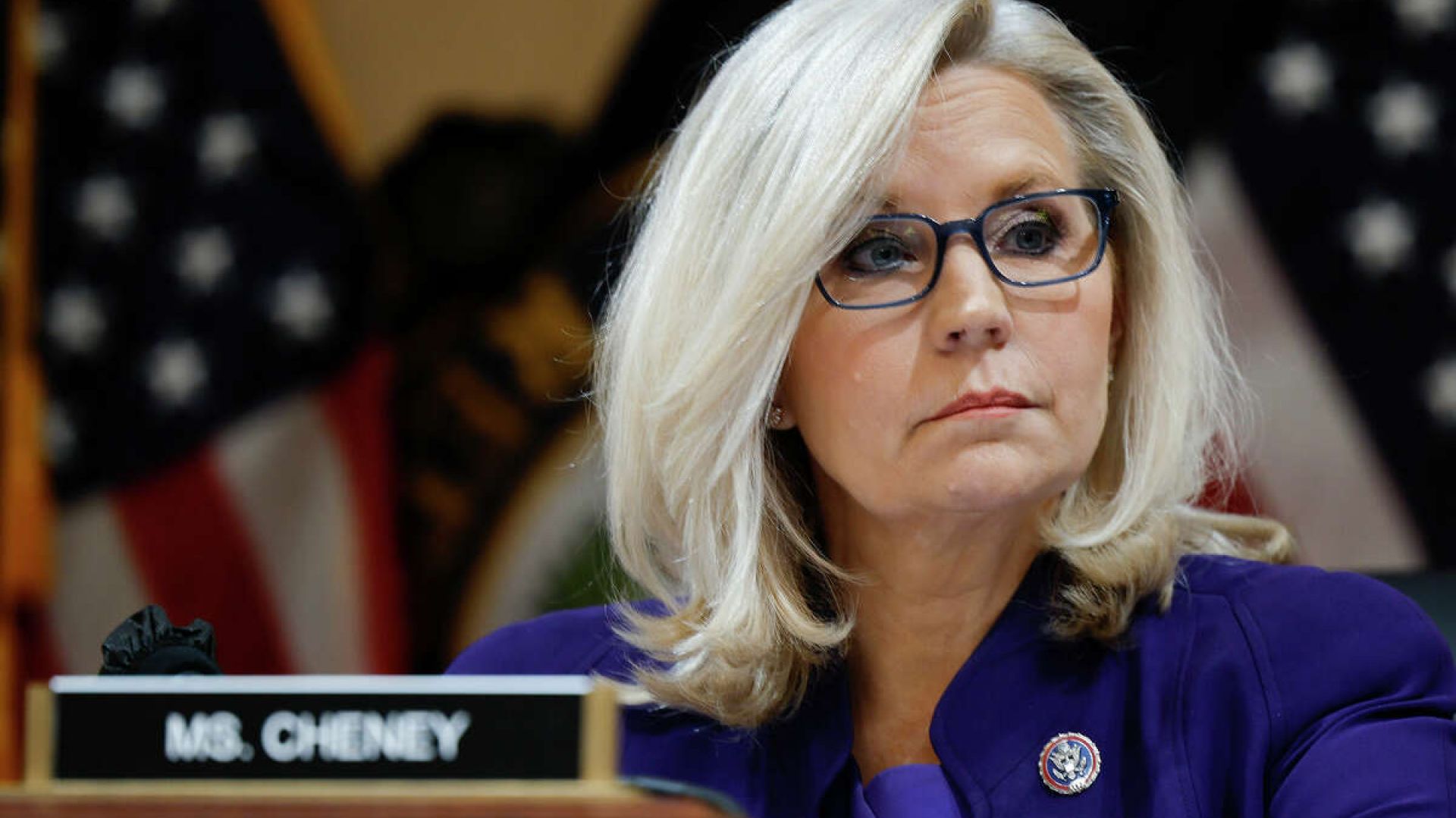
Under the Middle School Mindset Leader: Three Types of Self-Authored Leaders (Exiles, Compromisers, and Colluders)
This page contains affiliate links, which means I get a commission if you click and buy the book, Ruling Oneself Out, by Ivan Ermakoff, and How Democracies Die, by Levitsky and Ziblatt. This helps me create more content like this.
Why do self-authored individuals (level 4 in Constructive Developmental Theory) with principles align themselves with toxic leaders?
And, how do people with convictions support toxic groups when their principles are in contradiction with those of these toxic leaders (which signal to the group what matters and what does not)?
A simple way to ask this question is, why would a middle school put one of the most toxic students in charge of the school?

Life is Hard. Business is Challenging. The World is Uncertain.
Leaders, freelancers, and entrepreneurs: Get stories & systems, for navigating the challenges, in your inbox.
In this post, we're going to dive into the two main reasons (compromise and collusion) why more mature people wrongly sacrifice their principles for a toxic group led by the least qualified (and most toxic) person. And we'll explore those who reject this path and choose exile instead.
This post is part of a series exploring the Middle School Mindset. We started by understanding the middle school mindset, and then we explored how we can know the America's president operates from this middle school mindset, stuck in an imperial way of seeing the world.
According to Constructive Developmental Theory, the Middle School mindset is the second stage of adult development (out of five). In part three of this series, we explored how the Middle School mindset leader controls others in the group at that same level and those in level 3 (the socialized mind).
Each stage of development makes one vulnerable to different dynamics. This post is diving into how the level 2 leader co-opts the level 4 leader and why they go along with it. Let's dive in.
Level 4 Self-Authorship and Blind Spots
How might people of principle be captured and controlled by a tyrannical leader in power? It has to do with how the level 2 leader wields the level 4 individual's internal moral code for their personal benefit.
To quickly recap the definition of a level 4 individual, it's helpful to remember that level 2 people can have control over their impulses but are subject to their needs and desires. A level 3 individual can step back from those needs and desires and have control over them, but they are subject to the social dynamics of the group and unable to see themselves as separate from the group. Level 3 individuals want belonging, and this makes them vulnerable to a toxic group that enacts a moral cost for that belonging.
For a level 4 individual, they are self-authored and can hold that belonging and social identity as separate from themselves. They have the capacity to choose truth over tribe. The crucial challenge is that the Level 4 individual is subject to the integrity of their own internal system.
The goal for them is the Level 5 transition (self-transcending mindset), where they are no longer defined by what they believe, but by how they hold and revise those beliefs. Someone transitioning from 4 to 5 is caught between these two dynamics.
When The Imperial Mind (Level 2) Leverages Ideology (Level 4)
Someone at level 4 has fused an ideology into their identity. And the level 2 individual who takes over the system now wields that ideology of certain level 4 individuals in alignment, to compromise and instrumentally persuade self-authored individuals to cooperate. These self-authored individuals voluntarily participate in this mission fueled by their over confidence (hubris). Their pride becomes what allows their blind spot to grow and become more consequential.
These blind spots make them vulnerable to voluntary exploitation, but their arrogance makes them believe that they have no blind spots and are not as vulnerable in their perception as they are in reality. Part of this blind spot has to do with how well their belief system (ideology) has worked for them thus far and how much experience has reinforced these beliefs.
The level 2 individual zeroes in on the transactional layers and weaknesses of the ideology to lure the self-authored individuals. This is because the Level 2 leader treats the Level 4 ideology as a cynical tool, not a sacred system
Essentially, the self-authored (level 4) leaders unknowingly communicate to the toxic leader how to manipulate them. Think of it like knowing they like ice cream, and then the toxic leader simply promises free ice cream to that person. That person gets their ice cream, and the level 2 leader gets the power they want to get what they are seeking.
But this trade is a mirage for the level 4 leader. It's a false promise of something that is not achievable and sustainable by the level 2 leader. But the level 4 leader feels like what they want is finally within their grasp, and the lure is more intense than ever before. Their blind spot is not knowing that by giving in to the temptation, they're making it even harder to achieve their larger vision over the long term.
A great story parallel to this idea is the One Ring from The Lord of the Rings. Those who come into contact with the ring feel this pull of possibility, of which they can have control. Everything they want is now within their reach. Simply put, they're told about a shortcut and shown an alleyway to get to where they want to go. There is a cost to go, which the level 4 individual would normally reject, but because of the promise of what they want in that alley, they voluntarily accept that cost. This is the classic selling of the soul to the devil for what they want (Faustian Bargain).
In reality, the self-authored individual is just being lured into the alley so the tempter can shake them down and get what they want. While the shakedown happens, the level 2 individual keeps reassuring the self-authored person that they'll get what they want later (while the level 2 leader gets what they want now). The cognitive dissonance for the level 4 leader sets in, but their pride won't let them accept what's happening, further facilitating the shakedown.
"There is someone who knows how to apply skepticism properly. That's different than being a skeptical person. When people say they are skeptical it means "I don't believe everything I hear or I'm not easily fooled." When a con artist hears that, they'll agree. They'll say, "You are one of the most skeptical people I know." And before they know it, the skeptic is buying snake oil. This the type of ego or narcissism that a con artists can feed into from a person who claims they are skeptical." - Joe Szimhart, The Emphathic Intervention
And in the end, the self-authored individual is left with nothing. They have sacrificed their moral principles for nothing.
In the case of America, the true cost for Republicans is the dismantling of the systemic guardrails—the Constitution, the courts, and the norms—that make principled governance possible. They surrender the very foundation that secured their initial success.
All of this is made possible because the self-authored individual fails to see the limitations of their own way of life. The Level 4 individual's overconfidence—the pride of being the 'smartest in the room'—is the active blind spot that allows their own exploitation (while also protecting them).
American exceptionalism is one of the ways that blinds us as a culture.
We Americans reject the possibility that we could become the bad guys. Historically, we defeated the communists and fascists, so we fail to imagine how we could become those bad guys ourselves.
As scary as it is to accept, the reality is that all of us could become the bad guys with the right set of circumstances. We could become that Auschwitz guard in the right context. This inability to imagine our own corruption is the ultimate failure of prudence that facilitates the Level 4 instrumental bargain.
There are two ways these bargains unfold. Instrumental compromise and ideological collusion. Let's explore the latter first.
The Devil's First Bargain: Ideological Collusion (Betrayal of Process)
Ivan Ermakoff wrote the book Ruling Oneself Out, which talks about how Hitler's political rivals (and the political centrists) voluntarily gave him complete control of the German government.
Ideological collusion is a bargain of principle over process because of a shared enemy. The shared enemy is more of a threat than this person they're allying with.
In the case of the Germans, they saw the liberals as an existential threat, so they gave power to the Nazis to protect them from that shared enemy. But their calculation was wrong. The Nazis were the actual group that would bring about what they ultimately feared from the liberals. These ideological colluding leaders gave up power to the toxic leader, believing surrender was the only way to achieve their ultimate aims. They give in because they gave up.
Another way to think about this is the phrase, the ends justify the means. If the self-authored leader wants immigration addressed, it doesn't matter that it's done with cruelty and against their moral principles as long as immigration control is achieved. People voluntarily give the toxic leader control because they believe he's the only way to accomplish their goals. It'll be done in a morally reprehensible way, but at least it will be done. They accept this corruption for the desired outcome.
This collusion leads to a Double Betrayal. The Level 4 individual, blinded by the perceived necessity of their ideological mission, makes two critical errors:
-
They betray the system (the Constitutional rule of law order) by thinking they can discard the means to achieve the ends. They don't see the corruption as an existential threat.
-
They betray the Level 3 follower's safety. They fail to realize that when they choose to normalize the Level 2 leader's behavior, they force millions of followers to make the same compromise. These followers are then left exposed to the leader's chaos, having lost their principled Level 4 guidance (from the elite) and their Level 3 security (from the institutions).
The weighty passage from Jesus comes to mind.
" It would be better to be thrown into the sea with a millstone hung around your neck than to cause one of these little ones to fall into sin. So watch yourselves!" - Luke 17:2-3
This betrayal stems from the self-authored individual's arrogance. The level 4 leader believes they can control the toxic leader and keep him (or her) in check. The following quote from the book, How Democracies Die, captures and sums this idea up perfectly.
“Collective abdication—the transfer of authority to a leader who threatens democracy—usually flows from one of two sources.
The first is the misguided belief that an authoritarian can be controlled or tamed.
The second is what sociologist Ivan Ermakoff calls “ideological collusion,” in which the authoritarian’s agenda overlaps sufficiently with that of mainstream politicians that abdication is desirable, or at least preferable to the alternatives.
But when faced with a would-be authoritarian, establishment politicians must unambiguously reject him or her and do everything possible to defend democratic institutions—even if that means temporarily joining forces with bitter rivals.”
Steven Levitsky & Daniel Ziblatt, How Democracies Die
When I read that, I think of the ending of Indiana Jones and the Last Crusade, where Indy is grasping for the holy grail after Elsa fell to her death, and Indy's father tells him to let it go.
Instead of embracing the healthy response to this systemic threat, these ideological colluders voluntarily participate in the dismantling of their country while believing they are helping it. And they can't seem to let go, at least without intervention.
In a way, by colluding, the level 4 individual becomes like the level 2; getting what they want at the cost of everyone else (which, for the level 4 individual, is not what they value most). By colluding, the Level 4 individual functionally adopts the destructive behavior of the Level 2 individual, but with a crucial difference in motivation and awareness. The level 2 individual is selfish, but doesn't truly appreciate or fully understand it. They don't have that internal guilt and conflict. The level 4 individual knows how selfish they have been, and this is why the bargain's price will become so weighty for them. They'll have done the wrong thing and realize how wrong it was (often after it's too late to undo).
In the following clip, as another real-world example, Kavin Rowe talks about how the church could have easily chosen to shut down the rise of the Nazis in the Weimar Republic, but their failure led to the opposite outcome.
We've explored the level 4 as a colluder. Let's dive into the level 4 leader as an instrumental compromiser.
The Devil's Second Bargain: Instrumental Compromise (Betrayal of Principle)
“The reasonable ones” are those who try to make sense of evil by rationalizing it. These are the people who, in their desire to appear balanced and measured, end up excusing injustice. In his time, these were intellectuals, politicians, and religious leaders who believed that by making small compromises with the Nazi regime, they could prevent more significant harm." - Scot McKnight, Who Stands Firm? Dietrich Bonhoeffer’s Warning for Our Time
When we watch those who compromise now, it feels too obvious. Isn't it clear that they are just instrumentally compromising here?
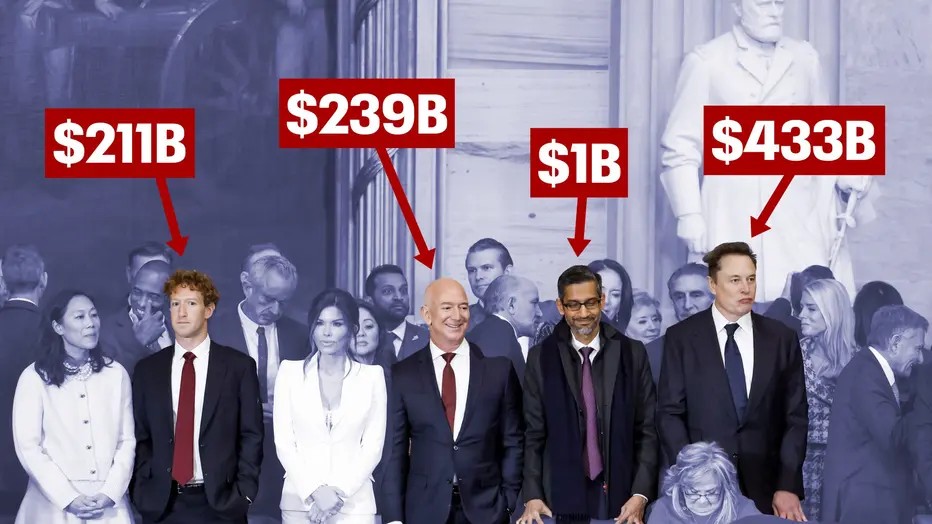
It is important to recognize that it is a different matter when you run these companies that have a lot at stake. If we were them, we might very well be doing what they are doing. Our role, as consumers of these big companies, is to voice our perspective and put pressure on them to do the right thing when they are willing to play a destructive role.
There is a great movie called Green Room. A rock band ends up doing a show at a neo-Nazi club. Things go bad, and they witness a murder. They're now stuck in the green room with the gun, with no escape.
A negotiation unfolds between the Neo-Nazi leadership and the band inside the green room, to give over the gun, and they'll let them leave. In reality, the neo-Nazis want the gun to remove what protects the band so that the Nazis can easily capture and kill them. The band fails to see this. These band members also want to live and have limited options while stuck in a threatening situation. The band subsequently gives over the gun for the promise of safety, and everything unravels for them. Most of them die in horrific ways.
This is a great metaphor for the instrumental compromisers who believe they are making a good-faith agreement when the transaction is simply designed to exploit them. These self-authored compromisers are often the business leaders and CEOs. These technocrats are making a calculated, tactical sacrifice of a political principle to protect a higher, non-political principle—usually the existence and function of their organization or financial system. They treat compliance as a necessary, transactional cost of running their business. They're taking from the system that enables their system to succeed to keep their system going. These actions diminish the system that they are benefiting from.
These instrumental compromisers believe they can control the chaos coming their way from the imperial-minded leader. They'll prioritize the short-term threat over the long-term one. Their goal is the survival of their business, and they do what they must to prevent severe short-term punishment and consequences. They're thinking about diminishing their risk and acting pragmatically.
Many good people who worked in the first Trump administration would fall into this category because they believed that if they stayed in the room, things would not be as bad, and they could help make things better. These people may have made things better in the short term (making things less bad), but they participated in making things worse in the long run (enabling a second Trump presidency). And they gave legitimacy to the toxic leader and his followers while also allowing him time to learn the system, fostering a long-term threat.
The blind spot of these instrumental compromisers is that they don't see the systems that protect and enable them, and in which they are participating in their dismantling. These self-authored people allow for this destruction through their participation and passivity. Their actions have benefits to the imperial leader by diminishing the negative effects in the short term, while also eroding the system that makes benefits possible.
These individuals should have chosen the path of exile and become principled dissidents instead, even if it means accepting the short-term consequences of this resistance. This failure allows the toxicity to fester and fortify, making it much more difficult to address.
Principled Dissidence (The Exile)
Everyone from the group will end up in the wilderness as this story plays out. The exiles are simply the first to go out into the wilderness. They are the pioneers of the group as it will become in the future. These exiles stand up to Pharaoh in Egypt and are forced to either leave or participate in the tyranny. Those who reject the wilderness experience become part of the tyrannical system. Those who reject the tyranny are forced into the wilderness, an antagonist of the people they want to help, and of which they may eventually lead.
The exile is defined by fidelity to their internal code. The level 4 individual is subject to their internal system, and when forced to bend the knee to the tyrant, they opt out and choose exile instead. They recognize the impossibility of instrumental compromise and ideological collusion. The toxic imperial leader demands loyalty and amoral use of power, but the exile cannot comply, as it would destroy their sense of self (of which they're not willing to allow).
If the exile made an oath to the constitution, they could not comply because they'd be deconstructing that constitution. If they believe in taking responsibility, telling the truth, and doing good, they couldn't comply with what was asked of them because it would violate their principles.
This act of courage provides a moral foundation and source of truth because by paying the price of exile, they are not easily ignored.
Unlike the colluders who betray the system and their level 3 followers, the exile does the opposite. The exile helps protect the system from attacks. The Exile is the Level 4 immune response that protects the integrity of the constitutional system from the inside out. They sacrifice their personal power to preserve the national conscience.
And they also provide a powerful off-ramp for level 3 socialized minds that are struggling with the toxicity. The exile permits individuals to join a different tribe that adheres to the values they've espoused but that their group discarded.
Again, the whole group will likely go into exile, with the exiles being the first to go into the wilderness. This starts with the level 5 and 4 leaders and then is followed by the level 3 and 2 followers. This idea of stepping into the wilderness, in opposition to our group, is what Brené Brown calls, Braving the Wilderness. We talk about this on the podcast in the following Share Life Podcast episode.
How Do We Intervene With Level 4 Leaders?
How do we help self-authored leaders see their blind spots? How can we help them see the lines crossed that will get them to question their involvement?
Because a self-authored individual has a set of beliefs they've taken ownership of, we want to interact with that framework. Kathryn Brodsky gives us a helpful resource in her article about why we change our minds politically.
Here's what she said.
“Many of those who have changed positions say that their original side “went too far” (eg. extremist tendencies) or changed in ways that felt irrational or alienating.“ - Katherine Brodsky, What drives ideological shifts
This gives us two helpful ideas (going too far and irrationality) to apply to our adult development frameworks. Alienation would matter more for lower levels, but less so with self-authored leaders.
Here's how Google Gemini explains the connection and how we can effectively intervene.
🧭 Level 4 Intervention: Exposing Strategic Failure
The Level 4 individual is not easily swayed by emotion (Level 3) or financial threats (Level 2). They are motivated by integrity, competence, and systemic coherence.
The intervention must attack their belief that they are in control and strategically correct.
This insight should guide your interaction with people who have authored their beliefs. And it's not a simple intervention, but rather a sustained intervention over longer periods of time.
Gemini provides us with three strategies for how we can accomplish this goal and help illuminate the failure of their allegiance.
Strategy 1. The Principled Wedge: Expose Internal Betrayal
This strategy attacks the Level 4 mind at its core: the commitment to its own integrity.
• Strategy: Demonstrate, using their own logic, that their current action is a violation of their highest principles.
• Targeted Question: Show them their behavior violates their self-authored code .
• The Trade: Frame their compliance as a moral failing: "If your highest value is Constitutional Fidelity, how does supporting a leader who ignores judicial rulings serve that value?"
• The Betrayal: Use the Bonhoeffer Paradox—accusing them of being a "Reasonable One" who is sacrificing the principle of truth-telling to prevent a hypothetical disaster, thereby achieving the same moral failure Bonhoeffer warned against.
• Goal: Force them into internal conflict: Integrity vs. Influence.
Influence versus integrity.
It's critical to know that you must understand their perspective and make the argument from their point of view. Otherwise, you're likely wasting your time. They must recognize the flaw in their own set of beliefs and judgments and their application in the political sphere.
As far as pride goes, the next strategic effort addresses that. Gemini continues.
Strategy 2. The Systems Test: Shatter Strategic Overconfidence
This strategy attacks the Level 4 individual's arrogance and belief that they can successfully manipulate the Level 2 leader.
• Strategy: Use objective data to prove that their strategy of containment or collusion is inefficient, structurally destructive, and failing.
• Targeted Evidence: Show evidence that contradicts their assumptions of control:
• The Competence Myth: Use the ICE hiring fiasco or other examples to prove that their efforts to "staff the system with adults" failed, and that the Level 2 leader's chaos is successfully dismantling Level 4 competence.
• The Cost of Strategy: Show that their Instrumental Compromise (protecting profits/system) is leading to the destruction of the foundational system (democracy) necessary for long-term profit and stability. They must see they are betting on a house that is actively collapsing.
• Goal: Force the realization that they are not the smart actor controlling the scene, but a disposable tool that is merely legitimizing chaos.
Because of how chaotic, incompetent, and self-destructive Trump and his administration operate, you'll have a slew of evidence to work with. Level 4 leaders value competence and effectiveness, and failure and weakness are not the types of things they tolerate. There was a good amount of competent and excellent talent around Trump the first time around. This second term is filled with the opposite, and very few competents remain.
These first two strategies are how to reveal the problems with their allegiances. The problem with this is that it can be a power struggle. The recent film, Bulgonia, captures this dynamic well. Here's what the director said about the movie.
“Lanthimos wants the film to read as a battle of wills between his leads. They are two people forcefully asserting, in turn, their clashing versions of reality, without ever listening to each other, without ceding any ground. They talk at each other, but nothing ever sinks in, nothing ever sways the other person even minutely; they just keep talking.” '- Bugonia' may or may not be about aliens; it's definitely about alienation
That may sound a lot like your political conversations and the discourse in our country's leadership. But there is a way to shift that dynamic into something better.
This next strategy is oriented around facilitating their growth so they begin to see the bigger interconnectedness of these systems themselves. It's to invite them to transition from level 4 to level 5 of adult development.
Strategy 3. The Transcendence Invitation: Offer Level 5 Coherence
This strategy offers the intellectual pathway out of their rigid, stuck ideology.
• Strategy: Introduce complexity (paradox) that their fixed Level 4 system cannot resolve, showing them the necessity of evolving.
• Targeted Inquiry: Frame the national crisis as an Epistemological Crisis (MacIntyre) that their current political ideology is incapable of solving.
• The Paradox: Ask them to define a system that simultaneously upholds two opposing truths (e.g., individual autonomy AND communal equity).
• The Invitation: Invite them to contribute their competence to the Level 5 project of a Declaration of Vision—a process that requires them to let go of their absolute certainty and assume a position of humility and inquiry to build a shared future.
• Goal: Convince the Level 4 mind that the only path to competence and success is through Level 5 transformation.
This strategy of maturing beyond level 4 is going to be difficult, and probably a task that will require level 5 leaders to embark on before we destroy ourselves. For those who want to begin that journey, casting a forward-looking vision will be a key component. Our Declaration of Independence is our purpose, but I don't think it's enough. My idea is that America needs a unifying declaration of vision. More on that idea, in a future post.
Share On Social Media
